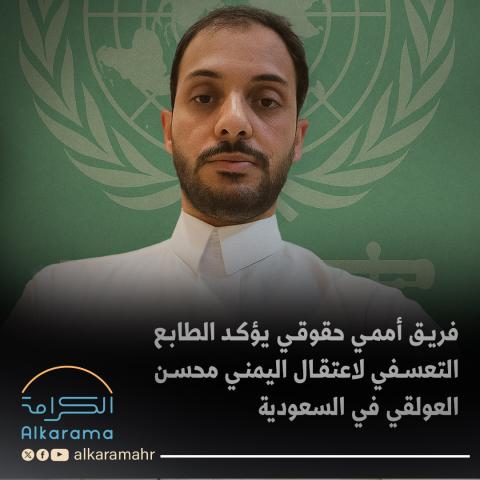
In its Opinion No. 1/2025, issued on 1 April 2025, the United Nations Working Group on Arbitrary Detention (WGAD) concluded that the detention of Yemeni national Mohsen Saleh Nasser Al-Awlaqi was arbitrary and remains unlawful, in clear violation of international law. This decision followed a complaint submitted by Alkarama on 23 October 2024 concerning the arrest of this construction worker in May 2021 in Saudi Arabia.
On 26 May 2021, Mr. Al-Awlaqi was arrested in Riyadh by plainclothes officers, without a warrant and without being informed of the reasons for his arrest. He was solely accused of expressing his religious beliefs online, including his alleged support for a group linked to “Ansar al-Mahdi.”
He was then held incommunicado for three months, with no contact with his family or access to legal counsel, treatment that the Working Group described as a blatant violation of his right to liberty and due process guarantees.
According to the Working Group, Mr. Al-Awlaqi’s statements, which did not incite violence, fell entirely within his rights to freedom of conscience and expression as protected by Articles 18 and 19 of the Universal Declaration of Human Rights. Nevertheless, his alleged affiliation with a religious minority opposed to Saudi Arabia’s official doctrine was deemed sufficient to convict him.
In November 2022, the Specialized Criminal Court, a special tribunal whose lack of independence has been criticized by the Committee against Torture and various UN special procedures, sentenced Mr. Al-Awlaqi to 20 years in prison and 80 lashes.
Deprived of legal assistance throughout the preliminary phase, he only met his lawyer on the day of his first hearing, one year after his arrest. The trial was conducted hastily, in clear violation of international fair trial standards.
Alkarama’s Submission
Mandated by Mr. Al-Awlaqi’s family, Alkarama filed a complaint with the Working Group on Arbitrary Detention, denouncing the complete disregard for international fair trial standards and, consequently, the arbitrary nature of his detention.
Alkarama pointed out that this arbitrary deprivation of liberty targeted not only Mr. Al-Awlaqi but formed part of a broader repressive campaign by the Saudi authorities against activists, religious scholars, journalists, bloggers, businessmen, and more generally, anyone peacefully expressing dissenting views. This crackdown has intensified since the Crown Prince came to power.
Alkarama thus requested that the Working Group recognize the arbitrary nature of Mr. Al-Awlaqi’s detention and urge Saudi Arabia to release him immediately. In response, the Working Group concluded that his detention was motivated by ideological and political considerations, amounting to a form of discrimination prohibited under international law. It called on the Saudi authorities to release him without delay, grant him reparations, conduct an independent investigation, and undertake a comprehensive reform of the judicial system.
Furthermore, the Working Group recommended a thorough investigation into the conditions of his detention, appropriate measures against those responsible, and referred the case to the Special Rapporteur on freedom of religion or belief and the Special Rapporteur on the promotion and protection of human rights while countering terrorism.
